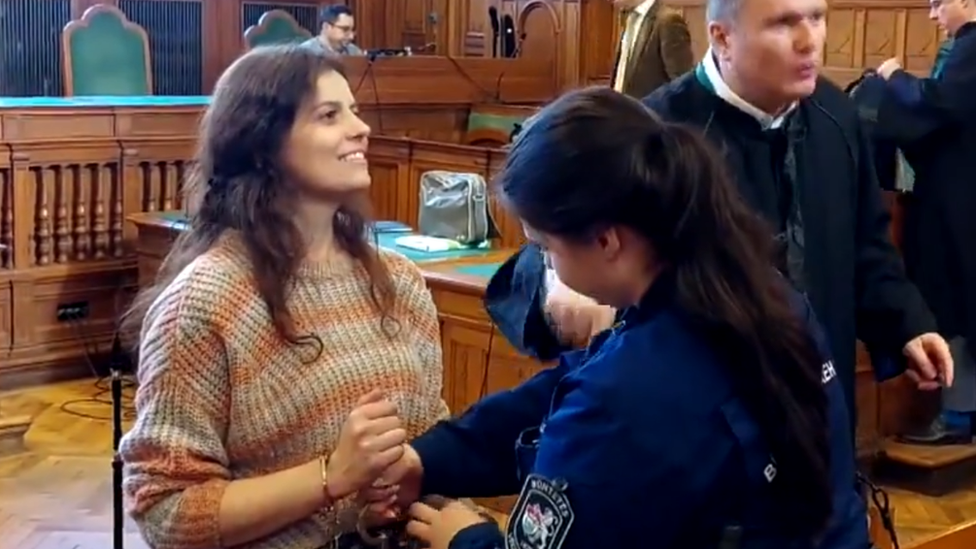Shackled woman in Hungary court sparks Italy anger
- Published

Ilaria Salis, 39, is a primary school teacher from Monza, near Milan
Italy has summoned Hungary's ambassador after images of an Italian woman in shackles appearing at a Budapest court sparked public and political outrage.
Ilaria Salis, a 39-year-old primary school teacher from Monza, near Milan, appeared in court on 29 January with restraints on her hands and feet.
She is accused of taking part in violent assaults against neo-Nazi sympathisers in February 2023.
A series of attacks took place in the wake of a neo-Nazi rally in Budapest.
Alleged far-left militants were suspected of assaulting several people following the yearly "Day of Honour" rally - a far-right commemoration of Nazi troops in besieged Budapest during World War Two.
A video showing anti-fascist activists kicking and beating a Hungarian, who is lying on the ground, has circulated widely in Hungary. The assailants are not identifiable.
Two German nationals were arrested alongside Ms Salis soon after. One pleaded guilty and was handed a 3.5 year sentence.
Ms Salis, who is charged with conspiracy to commit assault causing grievous bodily harm and faces 11 years in jail if convicted, has pleaded not guilty.
The prosecutor has claimed she and the other accused came to Hungary expressly "to carry out rapid attacks which could cause serious injury against people believed to be far-right."
Although Ms Salis has been in jail for almost a year, her case only began to attract attention in October after her father, Roberto, publicly spoke out about a letter in which his daughter reported the harsh conditions of her detention.
Later, in an interview with Italian newspaper Repubblica, a former cellmate of Ms Salis reported she was intentionally being held in a cell "full of rats and insects".
Interest in the case increased on Monday when images of a shackled Ms Solis in court were widely shared by Italian media. An online petition asking for Ms Salis to be brought back to Italy has so far gathered more than 90,000 signatures.
On Tuesday, Antonio Tajani, the Italian foreign minister, said he had summoned the Hungarian ambassador in Rome "to ask why some of the most fundamental norms on conditions of detainees were not respected".
"I believe the security measures adopted were excessive, this time," Mr Tajani told Italian media.
Italian Prime Minister Giorgia Meloni - who heads the right-wing nationalist Brothers of Italy party and is a a close ally of Hungarian Prime Minister Viktor Orban - has not yet commented on the case, but is being urged by parties across the board to intervene.
Five Star Movement leader Giuseppe Conte wrote on X, formerly Twitter: "Giorgia Meloni, we don't care that Orban is a good friend of yours - you have to be determined and raise your voice. The rights and dignity of Italians comes before friends and political allies."
Eugenio Losco, one of Ms Salis' lawyers, told the BBC that the scenes from court were "a clear violation of the European Convention on Human Rights that states that no-one can be subjected to torture or to inhuman or degrading treatment or punishment".
Mr Losco also said that Ms Salis stated that she hadn't been shown the video that allegedly puts her at the scene of the beatings, and she had not been shown a translation of the documents with the alleged evidence against her.
The Hungarian prison service pushed back against allegations of unsanitary conditions, which it said were false, adding that "hygiene checks are constantly carried out in the institutions and prisoners receive proper medical care".
"The presence of rats is a lie and prisons meet high hygiene standards," it added.
Prisons in Hungary are overcrowded and short-staffed, according to the Hungarian Helsinki Committee, a human rights group. Its September 2023 report lists a litany of complaints including bedbug infestations, cold, regulations which forbid exercise in cells, insufficient hot water and poor food.
Andras Kadar of the Helsinki Committee told the BBC that although Hungarian prison authorities "routinely use physical restraints when presenting detained defendants before the court... this is not only a breach of domestic legal principles, but is also in violation of the standards of the European Court of Human Rights."
The case - which is dominating headlines in Italy and is also being followed with interest in Hungary - is beginning to resonate elsewhere in Europe, too.
"This is very concerning," Juan Fernando López Aguilar, president of the European Parliament Committee on Civil Liberties, told the BBC. "Seeing such a medieval scene in the court of an EU state is just appalling."
Ms Salis's lawyer said that it was "quite difficult to be optimistic" about the outcome of the trial and accused Hungary's judiciary system of being "highly repressive".
Mr Losco added that his client should be allowed to spend their pre-trial detention in Italy, pointing out that EU law allows citizens to be held on house arrest in any member country of which they are a resident.
"I do not understand why this is not being granted this time," he said, adding that the danger she might escape was "non-existent".
Additional reporting by Laura Gozzi